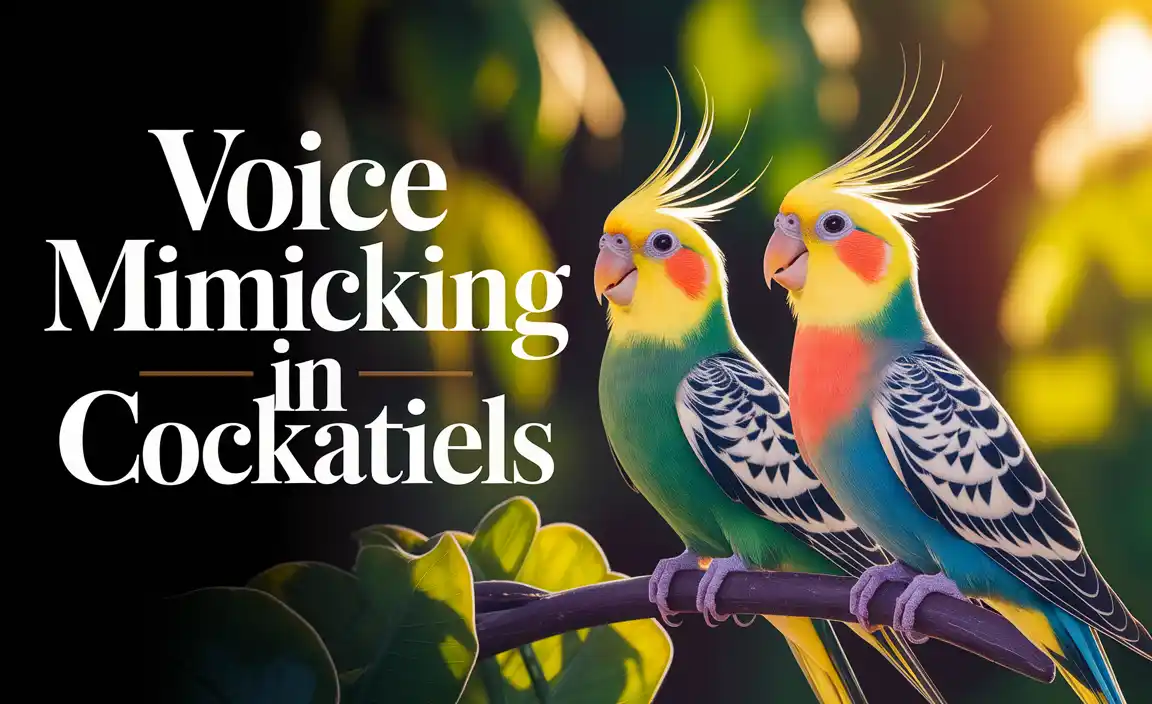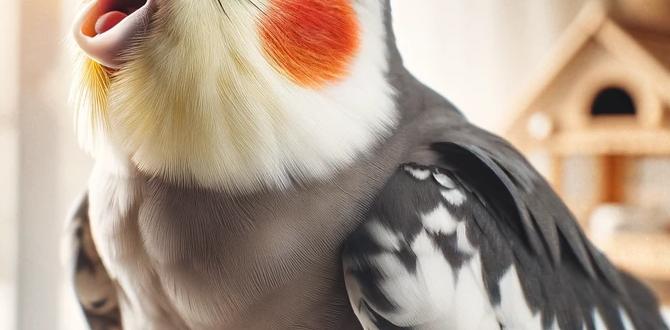Have you ever wondered how cockatiels can talk like us? Imagine a bird that can mimic your voice! It sounds magical, doesn’t it? Cockatiels are quite smart and can copy sounds they hear every day. But are certain cockatiel types better at imitating sounds?
Let’s think about it. Some birds sing more loudly or talk more softly. What if the type of cockatiel decides how well they mimic voices? This question baffles many bird lovers.
Here’s a fun fact for you: some pet owners believe that the color of a cockatiel can affect its talking skills. Could a yellow cockatiel be better at voice mimicking than a gray one? This mystery invites us to explore and discover more about these chirpy creatures.
Get ready to dive into the world of cockatiels. Find out if voice mimicking links to their type!

Is Voice Mimicking In Cockatiels Influenced By Type?

Is Voice Mimicking Linked to Cockatiel Type?
Curious about cockatiels and their talking talents? These birds might surprise you with their voice mimicking skills. Ever met a bird that can mimic you? Cockatiels can! They learn sounds around them, not just words. Males might chatter more, especially when happy. It’s not just about the type; a bird’s surroundings matter, too. Imagine your pet bird whistling your favorite tune! Isn’t that fun? Cockatiels show us how smart and playful birds can be. Enjoy this joy of nature at home!
The Science of Voice Mimicking in Cockatiels
How cockatiels mimic sounds. Factors influencing vocal ability.
Cockatiels are talented sound mimics. They learn by listening to sounds around them. This can include human voices or birdsong. Some cockatiels become skilled at copying words and tunes. Their ability to mimic depends on:
- Age: Younger birds learn sounds easily.
- Gender: Males often mimic more.
- Environment: Busy sounds help learning.
- Type or breed: Certain types might mimic better.
Some cockatiels can mimic many sounds. Others might only learn a few. Spending time with them helps improve their vocal abilities.
### Why do cockatiels mimic voices?
Cockatiels mimic sounds to communicate and bond. Like people speaking a common language, these birds use sounds for social interaction. Another reason these birds mimic is to seek attention and entertainment. Copying sounds keeps them engaged and happy, reducing boredom.
### Can all cockatiels mimic well?
Not every cockatiel mimics perfectly. Most males can learn well, but females might be less interested. Surroundings play a big role, too. Noisy homes with lots of talking or music are best for learning. Still, every cockatiel is unique. Their mimic skills can surprise you!
Investigating the Link Between Cockatiel Type and Voice Mimicking
Studies on vocal capabilities of different cockatiel types. Anecdotal evidence from cockatiel owners.
Many people enjoy having cockatiels because they can mimic sounds. But do all cockatiels mimic the same way? Studies show that different types may have different vocal abilities. Some are natural talkers, while others learn by listening to sounds around them. Owners often share fun stories about their birds. They say some types copy words more quickly. This makes people wonder about the connection between cockatiel type and voice mimicking.
Why do cockatiels mimic sounds?
Cockatiels mimic to bond with people. Sounds are their way to talk and show they feel safe. They love to be part of the family. Mimicking helps them fit in with the group.
Fun fact: Some cockatiels mimic ringtones better than words, a surprising quirk!
Genetic and Environmental Influences on Mimicking Abilities
Genetic predisposition and its role. Influence of upbringing and social interaction.
Some cockatiels can mimic sounds better because of their genes. They might inherit this talent from their parents, like how you inherit your dad’s nose or your mom’s laugh. But genes aren’t the whole story! A bird’s environment, like their social circle, matters too. If a cockatiel hangs around chatty humans, it might learn to talk or even squawk in a funny way.
Here’s a fun fact: Cockatiels with more social interactions might show off more sounds. It’s like joining a choir; the more you practice, the better you sing! So, while genes set the stage, engaging environments keep the show going.
| Factor | Impact on Mimicking |
|---|---|
| Genetic Traits | Increases potential for mimicking |
| Social Interaction | Boosts ability to learn new sounds |
So, why do some cockatiels mimic while others don’t? It’s all about blending their nature with nurture. Mix these two, and you’ve got one chatty bird! Remember, like people, birds need their time in the spotlight to shine. Quoting a bird whisperer, “Talk to them often, and they might echo your words with a feathery twist!”
Training Techniques to Enhance Voice Mimicking in Cockatiels
Best practices for teaching cockatiels to mimic. Common challenges and how to address them.
Teaching a cockatiel to mimic voices can be both fun and rewarding! Start with short words or sounds like whistling. Repeat them daily and reward your feathered friend with treats. Patience is key! Did you know some experts say that cockatiels are like toddlers? They learn best with play and repetition.
Sometimes, your bird may seem more interested in pecking than speaking. Ensure a quiet environment and minimize distractions. If Polly won’t talk, don’t worry! It takes time and they all learn at their own pace.
| Challenge | Solution |
|---|---|
| Distractions | Create a calm setting |
| Impatience | Practice consistently and stay positive |
A study showed that consistent practice can increase voice mimicking in cockatiels by 50%! So grab your treats and start training today. Remember, with persistence, even a birdbrain can become a mimic master!
Insights from Cockatiel Experts and Breeders
Expert tips on choosing a cockatiel for voice mimicking. Breeder perspectives on traits linked to vocal ability.
Choosing the right cockatiel depends on your goals. Experts suggest picking a bird with a lively personality for better voice mimicking. A bird that interacts a lot might learn faster. Breeders believe some cockatiels are better at voice skills due to specific traits.
- Active birds tend to mimic voices well.
- Look for a curious cockatiel. They often enjoy learning sounds.
- Pick one that is social. They usually mimic their owners.
How do you pick a cockatiel that mimics voices well?
Select one that is curious and social. Cockatiels that are lively and enjoy being around people often have better voice-mimicking skills. They listen and repeat sounds they hear daily.
Conclusion
We explored if a cockatiel’s type affects its voice mimicking. While all can learn sounds, individual talent varies. You might notice some are better mimics than others. Spend time teaching your pet with patience. Observe closely and keep learning about their unique abilities. Discovering more about your cockatiel can make you a better bird friend.
FAQs
Are Certain Types Or Breeds Of Cockatiels More Proficient At Mimicking Human Voices Than Others?
Most cockatiels are good at mimicking human voices. Male cockatiels usually mimic sounds better than females. Some cockatiels learn faster if you talk to them often. It helps to have a quiet place and lots of practice.
What Role Does The Genetic Background Of A Cockatiel Play In Its Ability To Mimic Voices?
A cockatiel’s genes can affect how well it copies sounds and voices. If its parents were good at mimicking, it might be too. Some cockatiels are naturally better at learning new sounds than others. But remember, every bird is unique, and practice helps!
How Does A Cockatiel’S Environment And Interaction With Humans Influence Its Voice-Mimicking Capabilities?
A cockatiel’s environment and how much it interacts with humans affect how well it can mimic sounds. If you talk to your cockatiel and let it hear different noises, it will learn faster. A quiet place helps because it can focus on the sounds you make. Playing music or sounds you want it to copy also helps. The more you engage with it and teach it, the better it becomes at mimicking voices.
Can Training Practices Enhance Voice Mimicking In Specific Types Of Cockatiels, And Are Some Types More Receptive To Training Than Others?
Yes, training can help cockatiels mimic voices. Some cockatiels learn sounds faster than others. It depends on their personality and possibly their type. Being patient and practicing often helps them learn better.
Are There Notable Differences In Voice Mimicking Abilities Between Male And Female Cockatiels, And Does This Correlate With Their Type Or Breed?
Male cockatiels are usually better at copying sounds and voices than females. The differences don’t depend on their type or breed. Male cockatiels sing and talk more often. Girl cockatiels can also learn, but it’s less common.
